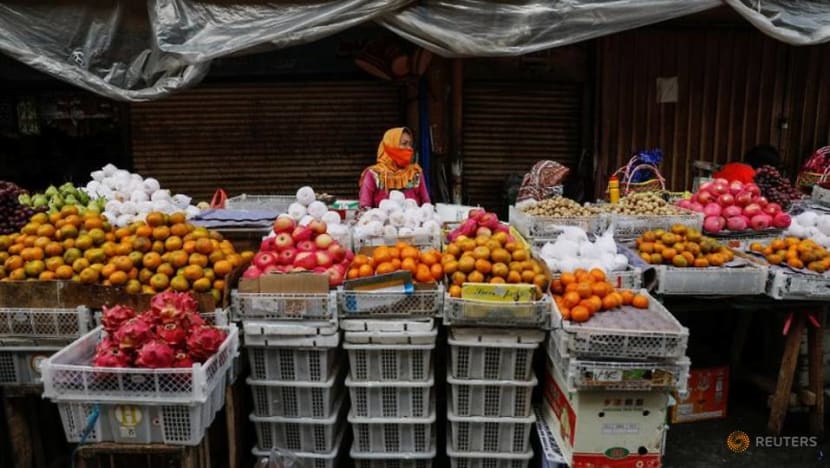Indonesia economy grows 7.07% in Q2, the highest since COVID-19 struck

FILE PHOTO: Vendors wearing protective masks to prevent the spread of the coronavirus disease (COVID-19) wait for customers at a traditional market in Jakarta, Indonesia, March 1, 2021. REUTERS/Willy Kurniawan
JAKARTA: Indonesia’s economy grew 7.07 per cent in the April to June period compared to last year, said the head of the country’s statistics agency on Thursday (Aug 5).
This figure is the highest since COVID-19 struck and marks the country’s exit from a recession.
Southeast Asia’s biggest economy fell into a recession not seen in more than two decades last year with an annual contraction of 2.07 per cent as COVID-19 curtailed people’s movements and business operations.
The second quarter figure compares favourably to the January to March period, where GDP contracted by around 0.7 per cent year-on-year.
The growth in the April to June period was driven by a growth in domestic consumption and export, said head of the statistics agency Margo Yuwono.
“The increase in community mobility in the second quarter of 2021 drove the growth of household consumption expenditure by 5.93 per cent,” said Mr Yuwono.
The higher export is a result of higher demand from Indonesia’s export partners, while mobility was high as Indonesia’ caseload decreased during the period, he added.
"In the second quarter of 2021, the export value of Indonesian commodities experienced an impressive increase of 55.89 per cent. The increase in exports occurred in agricultural commodities, processing industries, and mining," said Mr Yuwono.
He noted that Indonesia’s export partners such as the United States, China and Singapore grew 12.2 per cent, 7.9 per cent and 14.3 per cent year-on-year in the second quarter of this year.
On a quarterly basis, Indonesia’s economy grew 3.31 per cent compared to -0.92 per cent in the first quarter this year.
The Thursday announcement came after Indonesia lost its upper-middle-income nation status last month, just a year after it was classified as one.
Related:
Meanwhile, the archipelago is still battling a deadly second wave of COVID-19 cases which has claimed the lives of more than 100,000 people while infecting at least 3.5 million people.
“So this 7.07 per cent clarifies that with better handling of the pandemic, healthcare and daily caseload, it will increase mobility which will lead to a better economy. “This is our collective responsibility, if we want the economy to continue to grow, it depends on the COVID-19 handling,” said Mr Yuwono.
SLOWER GROWTH IN Q3: MINISTER
Commenting on the positive growth, Finance Minister Sri Mulyani Indrawati said that the second quarter data showed that most sectors have grown and this was due to government policies.
“So the second quarter illustrated that the direction of the economic recovery is correct, the economic strategy is also correct, and it has begun to show results or impacts,” said Mdm Indrawati at a separate virtual press conference on Thursday afternoon.
She pointed out that the economic outlook would now depend on COVID-19 management, especially on containing the contagious Delta variant which is currently dominating in Indonesia.
“Discipline is key,” she added.
However, the government predicted that the third quarter would not be as good as the second quarter as community restrictions have been imposed from Jul 1, she said. The curbs are set to end on Aug 9 currently.
However, Mdm Indrawati said she still hoped for a positive growth between 4 per cent and 5.7 per cent for the third quarter.
She noted that Indonesia cannot be complacent especially when dealing with the Delta variant, because it could potentially impact both domestic consumption and export.
The minister said that China, as well as the United States, Japan and South Korea, were currently also trying to curb an increase in caseload.
Meanwhile, speaking at the same press conference, Coordinating Minister for Economic Affairs Airlangga Hartarto also said that the third quarter would be affected by restrictions currently in place to curb COVID-19.
Mr Hartarto, who also heads the COVID-19 Handling and National Economic Recovery Committee (KPCPEN), said that he hoped the current active case of about 500,000 could be lowered to less than 200,000 by the fourth quarter.
The government was still observing when they could allow community activities as curbs that restrict mobility were still enforced, he said.
Mr Hartarto added that the government viewed the last quarter as a potential catalyst to turn the situation around.
He hoped a 3.7 per cent to 4.5 per cent growth year-on-year for 2021 could be achieved.
“The strategy is to ensure that the budget, which is the main driving engine, continues to run,” said the minister.
BOOKMARK THIS: Our comprehensive coverage of the COVID-19 pandemic and its developments
Download our app or subscribe to our Telegram channel for the latest updates on the coronavirus pandemic: https://cna.asia/telegram














